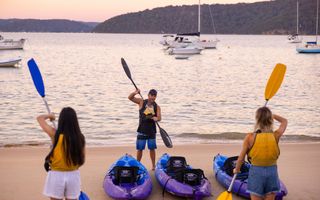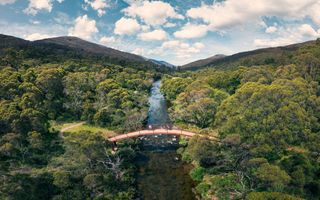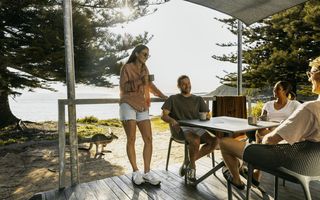Getting started
The first step in establishing a successful visitor economy business, such as hotels, attractions, and tour operators is careful research and planning. Taking the time to research your market, your competition and create a plan will help you set a vision for your business, identify opportunities and react swiftly to market changes.
Before buying or launching your business it’s a good idea to:
- Prepare a detailed feasibility study to assess all areas of your business and areas of risk
- Prepare a business plan that covers management, marketing, finance and human resources.
Starting points for your business plan
As part of your business planning process, try and set down the following:
Mission
A mission is a clear statement of your organisation’s purpose. Your mission guides everything you do, why you do it and what you want to accomplish.
Values
Your values reflect the experience you offer. Decide what your business stands for then establish the philosophy and values that guide your activities, both internally and externally.
Goals
Be specific about what you want your business to achieve. Your goals could refer to overall revenue or profitability, new products you want to launch or customer service standards you want to achieve.
Make your goals SMART: Specific, Measurable, Achievable, Realistic, Time-bound
TIP: Refer to your plan regularly and adapt it as required to meet market changes
Your local Business Connect Advisor or ABAI Advisors for Aboriginal Business is a great resource that can provide professional advice on starting a business and preparing a business plan. You can also check out other Government resources at business.gov.au.
Research
Research is an important first step in formulating a successful strategy for your business. It is essential to have a good understanding of the visitor economy in Australia, in NSW and in your region. Through your research, find out who is currently visiting your destination and who is paying for visitor experiences similar to yours. Try and understand everything you can about your potential customers. Through research you can understand your market’s needs, buyer attitudes and behaviour.
Research should also be an ongoing business practice. The tourism industry is constantly changing due to economic conditions, technology, and cultural and social trends. Staying up-to-date with market trends and changes in the industry will help you plan and be prepared for anything that may affect your business.
destinationnsw.com.au/research.
Other research resources include:
- Your Destination Network’s Destination Management Plan (DMP)
- Tourism Australia – Consumer Demand Project Research
- Tourism Research Australia (TRA)
- World Tourism Organisation (UNWTO)
- Australian Bureau of Statistics (ABS)
- NSW Department of Industry
Establish Demand
When starting a new business or developing a new visitor experience such as a tour, accommodation or attraction, it is important to ask is whether there is demand for what you are offering.
The following questions can help you form the basis of your research:
- What types of experiences are visitors to my region looking for?
- Is there a market for my product?
- Who is travelling to my region and what markets are they from?
- Can my product stand the test of changing trends in the industry?
- Are any other companies offering similar products or experiences?
- How much are consumers willing to pay for my product?
You can also gain valuable information on visitors and what they are looking for by talking to your Destination Network, local tourism organisation and visitor information centres.
Analyse the competition
NSW has a diverse range of visitor experiences. Before you get started, find out as much as you can about what else is available in your destination. Having a good understanding of the competition can help you identify gaps in the market so you can understand what makes your product or experience unique.
The following questions will help with your competitive analysis:
- Who are your competitors? – In your region, in NSW and in Australia?
- What standard is their product?
- What level of service do they offer?
- How often do they run their tours or experiences?
- What are their trading hours?
- What are their strengths and weaknesses?
- Do they sell their products through third party distribution channels such as online travel agents?
- How do customers book their products?
This process will help you identify the current gaps in the market and potential opportunities available to you.
Consider what makes your experience different from competitors and why it would be appealing to your target market. This will help you establish what sets you apart and identify your Unique Selling Proposition. A Unique Selling Proposition is what you have that your competitors do not, for example the highest quality, the lowest cost or the only product of its kind. Find out more about identifying your Unique Selling Proposition in our NSW First guide, Promote Your Tourism Business.
You can start reviewing similar products and experiences by:
- Looking up other businesses including tours, attractions and accommodation on visitnsw.com and sydney.com
- Reading the product fact sheets produced by Destination NSW at destinationnsw.com.au/tradefactsheets
- Checking out review sites, including TripAdvisor, to identify what competitors are doing well and why
- Talking to your local industry to gain further insights about your region, including your Destination Network, Visitor Information Centre and other visitor economy businesses
- Contacting your Destination Network and referring to your Destination Management Plan (DMP) to find out if particular gaps, challenges and opportunities exist in your region.
Understand seasonality
A good understanding of the seasonal fluctuations that will impact your product and your destination will help you significantly with your business planning. High and low seasons can be influenced by climate, weather, school holidays, weekends, special events and more. Ensure that you are ready to cope with the demands of the high season and have appropriate strategies in place for the low season. This comes back to careful planning and understanding of your business and where you are located. For example, will you need extra, properly trained staff at certain times of the year? Does your cash flow allow for the low and shoulder seasons? Can you introduce promotions and packages in the slower months? Can you target new markets that travel outside of peak seasons?
Getting the right advice
Destination NSW is here to support you as you establish and develop your visitor economy business. There are also many other organisations available to provide assistance, so don’t be afraid to reach out and ask for help.
Business Licensing
ABLIS
You may need Government licenses and permits before you can start your business. The Australian Business License and Information Service (ABLIS) is a free service that simplifies the process of finding out which licenses your business needs.
National Parks
Tourism operators wishing to conduct businesses within a National Park must obtain the required approvals and authorisations from the National Parks and Wildlife Service before they can conduct any activities. Nationalparks.nsw.gov.au
Business Connect
The NSW Government provides a Business Connect advisory service for small-to-medium businesses. Through the program you can:
- Get advice on managing your small business
- Access face-to-face support
- Develop key business skills. Find a Business Advisor near you.
Destination NSW Product Feedback
Destination NSW has a dedicated Product Development team to assist new and established visitor economy businesses to develop, promote and sell their experiences.
Get tips from the team on accessing visitor and sector research, product design, development and market suitability, sales, and distribution channels. We can also help you become export ready and use publicity, promotions and social media tools to market your business.
Read this resource first, then get in touch with the team at product@dnsw.com.au.
ACCOUNTANT, FINANCIAL ADVISER OR BOOKKEEPER
These professionals can help to:
- Forecast your running costs, cash flow and turnover requirements
- Determine if you have sufficient funds to invest or how much you will need to borrow
- Financially manage your business
- Develop your budget.
A solicitor or other legal practitioner should be consulted on any contractual or other legal arrangement you need to make for your business, for example:
- Lease agreements
- Sale of business contracts
- Business set up
- Operational contracts.
INSURANCE COMPANY OR BROKER
Talk to an insurance company or broker to determine what insurance cover you will require for:
- Public liability
- Property damage
- Loss of income
- Workers compensation.
You need to make sure you protect yourself, your employees and your visitors
TOURISM CONSULTANTS
These consultants have extensive local knowledge and offer a variety of skills and experience in product development, marketing and operational management. Set a clear brief and expectations to manage their service delivery.
TOURISM OPERATORS
Talk to operators in similar or complementary businesses and other tourism businesses in your region.
Other operators can provide great insights and be valuable contacts and partners.
TOURISM ORGANISATIONS
Destination NSW, your Destination Network, local tourism organisations and your local council can provide advice about the visitor economy in your area and should all form part of your support team.
Engaging with other businesses
Starting and running a business requires excellent time-management skills. You will need to allocate both financial and human resources and decide who should perform the different tasks involved in running your business. You might like to think about how you could save potential time, money, and energy by outsourcing some of your tasks.
For example, many small accommodation operators recognise that it can be more profitable to spend their time on marketing and development rather than cleaning. They may decide to outsource to a professional cleaning contractor so they can concentrate on building the business.
Before outsourcing any aspects of your business, ensure you have a budget in mind and a complete understanding of how you want the task completed. Provide the company/contractor with clear guidelines around the task(s) you have requested of them. For example, if you engage a professional web developer to build your website, brief them clearly with expected outcomes, deadlines and final costings.
READ NEXT: Creating your product
.jpg?rect=0,177,3464,1949&w=320&h=180&fit=min&auto=format)


